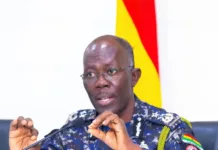
Lately, the Ghana Police Service has been the subject of much public scrutiny. From the recent spate of armed robberies, to allegations of corruption, our police are always being evaluated.
However, as an attorney working for an international Anti-Human-Trafficking Non-Governmental Organisation (NGO) here in Accra, it has been a pleasure to watch our police collaborate in ways we have not seen in other countries. In the course of our work, we have watched as the Marine Police and the Anti Human-Trafficking Unit (AHTU) of the Ghana Police Service have cooperated in the rescue of 100 children from Volta Lake in 2017.
The credit for this distinction begins with the Inspector General of Police (IGP), Mr. David Asante-Apeatu. Since taking office, he has shown a remarkable amount of enthusiasm and commitment to fighting the scourge of human-trafficking in Ghana. As the head of the Ghana Police Service, Mr. Asante-Apeatu has made it a priority to protect the children of our country. More specifically, he has made it a focus of the Service to fight human-trafficking on Volta Lake. For this unwavering commitment; he should be applauded.
Likewise, just as Mr. Asante-Apeatu is worthy of praise, so too are the units under his command. The IGP brought together units from across the Ghana Police Service to work together to fight human trafficking. These units include the Marine Police, AHTU and the Police Hospital.
The officers under these units always respond promptly whenever called upon, even on short notice. The individual officers and their commanders responded brilliantly to the mission given to them by the IGP. They have ever been ready, willing, and able, to venture out onto Volta Lake, to save our children from the life-threatening peril they face working on the Lake. These fine officers have undertaken this work with little thought given to the inherent dangers of working on the Lake. Such is their overwhelming commitment, enthusiasm, and zeal to end this menace that they sometimes work late into the night with no concern for their personal safety. It is this personal commitment to the mission, and the integrity with which it is accomplished that should serve as an exemplar to our nation of how our police can operate.
This collaboration within the Ghana Police Service is vital to our natural interest as a nation because the trafficking of children into hard, dangerous labor is a canker; gradually eating away the fabric of our society. The trafficking of children onto Volta Lake is not only illegal, but puts the most vulnerable members of our population at risk of injury and death. It denies the future generation of a much-needed education and separates them from their families.
Moreover, child trafficking is beneath us as a people, it serves only to humiliate our nation on the international stage, and to prevent the flourishing of our children. This is a crime that must be eliminated in Ghana.
There are some in our nation who would say that this crusade to end what I will call modern-day slavery is unnecessary and overblown. I would argue however, that the facts do not bear this out. The Ghana Statistical Service estimates that 1.2 million children in Ghana are engaged in some form of hazardous child labour. Approximately, 50,000 children work in Ghana’s fishing industry. Work, which by definition, in the Children’s Act of 1998, (Act 560) is considered hazardous.
Moreover, a study undertaken by my own organization, and available for scrutiny, found that over 50% of the children on the southern portion of the Volta Lake had been trafficked into hard labor. The facts are that thousands of our children are little more than slaves. Most of them are denied education, leisure, healthcare and other basic rights.
I highlight these facts to make clear that these are not children merely working for a parent or a family member. These children are not merely engaged in some form of child labor. These children are bought and sold as a commodity. We owe them far better. The National House of Chiefs placed plaques at both Cape Coast Castle and Elmina Castle which read “In Everlasting Memory of the anguish of our ancestors. May those who died rest in peace. May those who return find their roots. May humanity never again perpetrate such injustice against humanity. We the living vow to uphold this.” This is an admirable sentiment, but to uphold it, we as a nation must commit to ending child trafficking. The Ghana Police Service have shown such a commitment.
I write this today to laud our Police Service for displaying commitment to this great mission, and following through with distinction, determination, and professionalism. The combined expertise of the varied units of our police service have served us well in fighting this abominable crime. Reasoned criticism of the police is always appropriate in a free and modern society. However, for their effectiveness in combatting the evils of child trafficking in Ghana, our police should rightfully be highly praised. In taking up this fight our Police Service’s consummate devotion to duty reflects lasting glory upon itself and upholds the finest traditions of Ghana.
By Esther Kpikpi | The writer is an attorney with International Justice Mission, Ghana. You can contact her at ekpikpi@ijm.org




